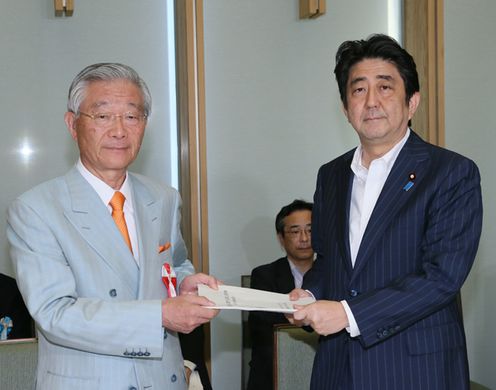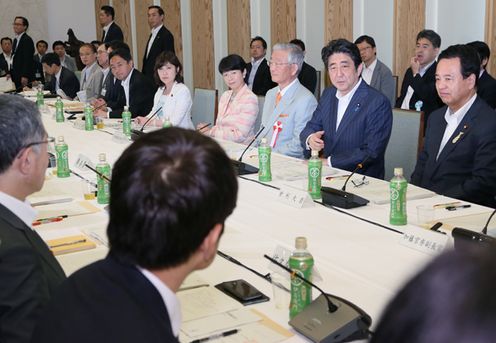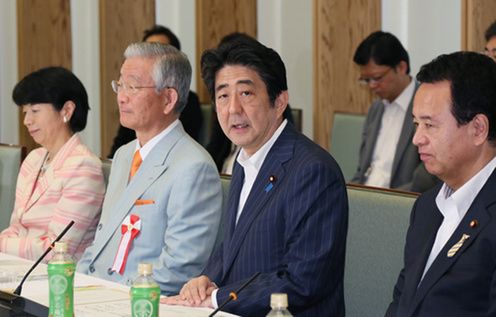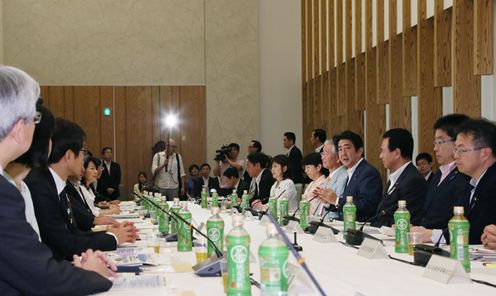Home > News > The Prime Minister in Action > June 2014 > Regulatory Reform Council
Regulatory Reform Council
Friday, June 13, 2014

Photograph of the Prime Minister receiving the report

Photograph of the Prime Minister delivering an address (1)

Photograph of the Prime Minister delivering an address (2)

Photograph of the Prime Minister delivering an address (3)
Prime Minister Shinzo Abe attended the 35th meeting of the Regulatory Reform Council at the Prime Minister's Office.
During the meeting, the “Second Report on Regulatory Reforms” was compiled, and Mr. Motoyuki Oka, Chair of the Council, submitted the report to the Prime Minister. Later, a report was made on the “Report on Taxi Regulations by the Working Group on Business Start-ups and IT” and “Follow-up Results of the Regulatory Reform Implementation Plan.”
The Prime Minister said in his opening address,
“I would like to offer my sincerest appreciation for the submission of the Second Report on Regulatory Reforms today.
Regulatory reform represents a core component of Abenomics. I believe your report includes strong recommendations that boldly call for reforms of vested interests, centered on healthcare reform and agricultural reform, which before seemed unfathomable.
For this, I would like to again offer my thanks to Chair Oka, Acting Chair Ota, and all council members.
These reforms have already been underway for a long period of time and have been in place since the Koizumi administration, which illustrates how truly challenging they are. Nevertheless, you have given us a prescription for addressing these challenging reforms. All that is left is for us politicians to execute and generate solid results.
No matter how difficult these reforms may be, if the nation has a solid plan and commitment, they can be and indeed have been carried out.
Take infrastructure exports, for example. We had a plan in place to double infrastructure exports. In the first year of this plan, which was the year before last, we saw infrastructure exports of 3 trillion yen, and then last year these amounted to 9 trillion yen. Other ministers and I have traveled overseas and directly engaged in negotiations to conduct sales at the highest level. This has in fact led to extremely positive results.
In terms of the medical field, we have established a system for medical treatment that originates in patients' requests, to create a patient-oriented framework. Although this is a provisional title, the Ministry of Health, Labour and Welfare’s name for it will be very easy to understand and unique. In other words, I believe that an easy-to-understand policy intention carries with it significant implications for the medical system.
I firmly believe this will serve as encouragement for patients battling difficult-to-treat illnesses. In particular, under the previous framework, some applications took nearly half a year to be approved. In the new framework, that amount of time will be remarkably reduced.
People who may only have one week or two weeks to live apply for new drugs, and so we have to process such applications in the shortest amount of time possible. Until now we have not taken into account the standpoint of such patients. It is thanks to your hard work that we are now looking at things from the patient’s point of view. I believe you have brought about great change.
In terms of agriculture, we will collectively reform agricultural commissions, corporations' ownership of farmlands, and agricultural cooperatives.
In particular, this reform of agricultural cooperatives represents the first fundamental reform in nearly 60 years. Farmers and regional agricultural cooperatives play a key role in agriculture. I believe we must tackle this fundamental reform with unflagging resolve. We are looking at how to reform the Central Union of Agricultural Co-operatives to revitalize agriculture and regional agricultural cooperatives. We need to start over from scratch. Our efforts must not end up being reform in name alone.
Politicians, including Mr. Inada and myself, believe that the regions represent our support base. Having been acquaintances with many farmers and shaken their hardened hands quite often, I feel a particularly large sense of responsibility after hearing people tell me ‘We have faith in you, Prime Minister Abe.’ The fact of the matter is that there are many things we have failed to do, including thinking about how to raise their incomes. Japanese farmers and producers are without a doubt serious about creating good produce. However, we need to think once again whether this good produce really fits consumer needs, whether it produces added value and whether they have put in the work for exports. As organizations designed to achieve this, I would like to ask agricultural cooperatives to exert great efforts.
Unfortunately, employment and labor issues remain.
The act of applying an incorrect label from the start, such as zero overtime pay, caused a lot of issues. In the end, these initial worries turned into reality. I am a very persistent person, and I am determined to take on this problem once again, together with all of you, and produce real results.
The motto of the Abe administration has been speed and execution. I would like to immediately start on a specific policy design for both the new system for medical treatment that originates in patients' requests and reform of agricultural cooperatives, in order to submit a bill in the next regular session of the Diet. I ask for everyone's cooperation with this.”



